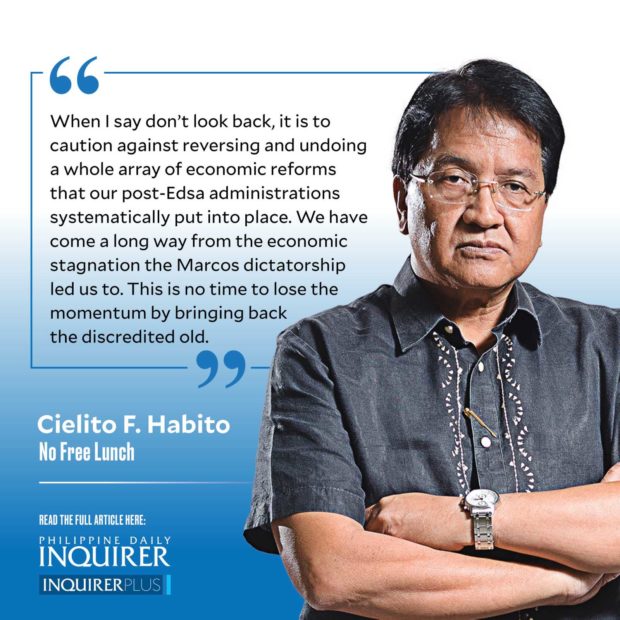Five ways forward
In my recent economic briefings, I outline five things we must do as we navigate our way to the post-pandemic global economy from our little corner of the world. I state these as follows: (1) Put people first; (2) Copy our neighbors; (3) Reshape our services; (4) Look outward; and (5) Don’t look back. Let me elaborate.
Putting people first must be foremost as it was on human lives that the COVID-19 pandemic took its heaviest toll, with the common Filipinos’ health, nutrition, and education severely impaired. Moving forward, I see at least three important directions to pursue. First is to upgrade our public health system, starting with cleaning up and fixing the corruption-ridden PhilHealth, the very institution primarily tasked with promoting public health. Second, we must reconfigure our food systems and food security strategy, emphasizing food accessibility and affordability, thus ensuring that our food producers are highly productive and internationally competitive. And to address the country’s education crisis that the pandemic further exacerbated, we need a new multisectoral education commission, as convened in the Cory Aquino and Ramos administrations, to plot our post-pandemic education roadmap. We must look to the example of leading countries like Finland and other global models with superior education outcomes.
Copy our neighbors particularly pertains to agriculture and agribusiness, which I consider the backbone of the Philippine economy. There is so much we could learn from countries around us, including those who, ironically, we mentored decades ago. Lessons include having our Department of Agriculture look well beyond the farm gate, but concern itself with the entire value chain spanning farms to final consumers. Malaysia has its Ministry of Agriculture and Food Industries, and Vietnam has its Ministry of Agriculture and Rural Development, showing the much wider scope of their agriculture ministries’ concern. Thailand calls it the Ministry of Agriculture and Cooperatives, showing how crucial it is to them to consolidate farm management through agri-industry co-ops along with contract growing schemes to achieve scale economies and higher value-adding (and incomes) for farmers. And one glaring difference we have with our neighbors is our low budgetary allocation for agriculture, taking only 1.7 percent of the total budget, against 3.4, 3.6, and 6.5 percent for Indonesia, Thailand, and Vietnam respectively.
Reshaping our services is all about improving the quality of jobs in our most jobs-rich sector, and this entails gearing up for the new digitalized economy in the age of the Fourth Industrial Revolution. New financial technologies are critical to empowering small producers and savers, and low-income households. We must ramp up domestic tourism to make up for slow-recovering foreign tourism, especially highlighting eco- and agritourism potentials that tap the synergy between the farm and services sectors. We must retool and direct our workforce toward technology, creative, and logistics skills, while fostering entrepreneurship by deliberately easing the numerous bureaucratic burdens small Filipino enterprises must hurdle.
Looking outward means adopting an aggressive and opportunistic mindset for our producers to look well beyond our limited domestic market, which traps us in a vicious cycle of low incomes and high poverty that perpetuates the limited domestic market. We must chart an aggressive new Philippine Export Development Plan that examines and addresses the entire landscape spanning the macroeconomic environment down to commodity-level strategies and programs. And we must participate actively in trade agreements like the Regional Comprehensive Economic Partnership to tap even wider opportunities to diversify our exports both in products/services and destination markets.
Finally, when I say don’t look back, it is to caution against reversing and undoing a whole array of economic reforms that our post-Edsa administrations systematically put into place. We have come a long way from the economic stagnation the Marcos dictatorship led us to. This is no time to lose the momentum by bringing back the discredited old.






















